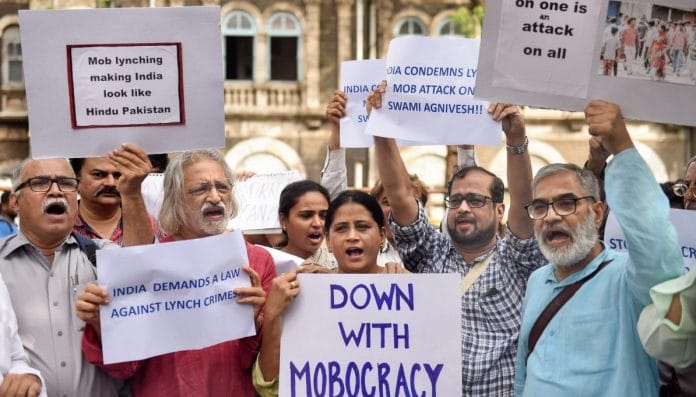Changes to the law must address ability of police and prosecution agencies to act against those who create climate for mobilised violence.
As the government scrambles to act upon the Supreme Court ruling on creating a new provision on lynching, there is a related field that requires urgent legislative attention: laws against hate speech.
The necessity of a new provision to file charges against and prosecute those who engage in incidents of mobilised violence in India can be debated. But it is just as important to hold the instigators of mobilised violence liable as it is to go after those who engage in the violence itself.
The changes needed to the status quo are two-fold: one, introduction of a narrowly construed provision that addresses incitement or provocation of violence; and two, repeal of certain existing provisions that do more harm than good.
Repeal ill-drafted provisions
Hate speech is not defined under Indian law. However, several provisions under the Indian Penal Code, 1860 and a few other statutes restrict speech on various grounds. On paper, such restrictions on the constitutional right to freedom of speech and expression are valid if they are reasonable. The restrictions should be as narrow as possible and should function as an exception to a person’s right to freedom of speech and expression, not the rule.
Unfortunately, this is not the case. The provisions in the IPC that impose such restrictions are a textbook case of poor drafting. They use vague language to criminalise acts such as promoting disharmony or feelings of enmity between groups or outraging the religious sentiments of a community. While the courts have read down the scope of some of these provisions over time, they have also repeatedly upheld their constitutional validity. It would be unwise to continue to rely on the judiciary to shape the interpretation of these provisions in the future.
It is also the case that despite the efforts of the judiciary to rein in the applicability of these provisions, they have a well-documented history of being abused to target minority voices, artists, and dissidents. This is a clear failure of the legislative intent behind such laws. Curbing hate speech is meant to protect those against whom it is targeted, enabling them to express themselves without fear of reprisal. The irony of the existing provisions being used to target legitimate exercises of free speech drives home the need to remove them from the statute. The legislature must wake up to this danger and repeal these ill-drafted provisions.
This, however, is only part of the solution.
Protect the individual
Repealing the existing provisions will leave a gap in the statute that must be filled. This can be done by the introduction of a provision that complies with the standard of reasonable restriction under the Constitution. To achieve this, the drafting of the provision must subscribe to a few criteria.
One, it must be narrowly constructed to penalise only that speech, which has incited violence or is grave enough to provoke violence. Thus, the speech must have a proximate connection to the undesirable outcome that is meant to be avoided, that of targeted violence. While some judgments have already noted this requirement, it is time to enshrine it in the rulebook itself.
Two, the focus must shift from protecting groups to individuals. The existing provisions have been used by groups to move against individuals because their group sentiments have allegedly been hurt. Three, the punishment prescribed must be severe enough to dissuade individuals from engaging in hate speech to generate political capital.
This can take the form of an amendment to the Representation of the People Act, 1951 that includes a conviction under this new provision as a disqualifying criterion for holding political office.
This conversation around addressing the infirmities in the country’s laws against hate speech is not a new one. In fact, the Law Commission in its 267th Report admitted that the current legal framework is inadequate to tackle the problem and by extension, the incidents of mobilised violence it can lead to. It recommended the inclusion of new provisions that, to a large degree, imbibe the criteria outlined above.
While the Commission’s failure to call for a repeal of the existing provisions was a missed opportunity, the new provisions it recommends serve as an excellent template on which any restrictions on free speech can be based going forward. These recommendations have been in the public sphere since March 2017. It is time for the government to act on them now.
A necessary caveat to end this article with is that the inclusion of a well-drafted piece of law can only be effective if the relevant authorities are empowered to make use of it. Thus, the changes to the law discussed here must take place within a wider conversation that addresses the ability of the police and the prosecution agencies to take action. A holistic approach to solving these systemic problems will go a long way towards eradicating the spectre of mobilised violence.
Ajay Patri is an Associate Programme Manager at the Takshashila Institution, an independent centre for research and education in public policy. His primary research interests lie at the intersection of technology and policy.







How will you define hate speech? This big question will arise. Ultimately, it will lead to censorship. Sorry, but speech leading to violence is not the criteria. Because I would say something, and another group breaks out on violence, then I would be arrested, though I had nothing to do with that violence.